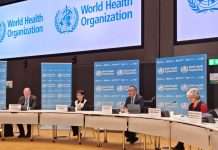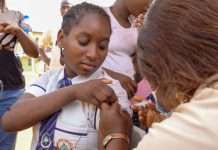-
As Lagos AfriHealth Expo Holds at Airport Hotel

A Consultant Gynecologist, Dr Ibrahim Wada, has drawn the roadmap to quality healthcare in Nigeria, which will accommodate most Nigerians at very affordable rates, without any hitches. Wada, who is the CEO, Nisa Medical Group and President, Association of Fertility and Reproductive Health (AFRH), made the submission at the Lagos AfriHealth Expo, a 3-day healthcare exhibition, held at the Lagos Airport Hotel, Ikeja, recently.
He maintained that for the Nigerian healthcare system to deliver effective coverage to all citizens, urgent steps must be taken to revamp and reposition the PHCs, appropriate distribution of basic health funds accordingly, and implementation of the national emergency call centre.
Wada, the keynote speaker at the exhibition, also recommended the creation of working partnerships between private and public practitioners, as well as effective combination of short, medium and long terms for an improved healthcare delivery sector to emerge.
The best ways to improve access to quality healthcare in the country according to him are as follows: “Revamping and repositioning the PHCs, effective application of the basic health funds, implementation of the National Emergency Call Centre, address shortages in the Nigerian health workforce, telehealth and remote patient monitoring, expansion of the NHIS to UHC, and public private partnerships (PPP).
“Short term, medium and long term measures must all work together to delivery health care quality and to improve health indices for Nigeria.”
Speaking on the theme of the event, “Quality Healthcare Accessibility in Nigeria”, Wada described quality healthcare accessibility in Nigeria as an enormous task ahead.
In his presentation titled: “Overview of policies and regulation for healthcare investment, finance, and insurance in Nigeria”, Barrister Toyosi Odunmbaku, emphasised the need to bridge the gap of out-of-pocket financing, as he urged practitioners to employ the use of government-backed health insurance schemes that captures both the private sector and the informal sector.
Odunmbaku, a senior member of the Jackson, Etti & Edu’s health and pharmaceuticals sector team, asserted that the National Health Insurance Act’s coverage has only been limited to the Federal Government workers and a few states; hence, there is need for more micro insurance policies within the law.
He maintained that the purpose of health financing is to make funding available, as well as to set the right financial incentives in place for providers, to ensure that all individual have access to effective public health and personal healthcare.
Speaking on healthcare finance challenges, he said, “Out of pocket expenditure in Nigeria stands at 77.2 per cent as at 2017 and ranks in the top 5 globally.
“More healthcare providers need to start seeing healthcare as a business. It will assist in the ability to attract private capital and also in dealings with foreign investment. Healthcare providers with foreign capital need to put in place good corporate governance structure.
“Financial investors usually have a short-medium term investment horizon in the Nigerian healthcare sector. However, a long-term investment horizon and impact investing approach will be more suitable for healthcare Nigeria and many developing markets.
Odunmbaku further described opportunities in healthcare finance in Nigeria as achievable only through the combination of capital from risk adverse institutional/private investors and NGOs/government institutions/international organisation. As a result of this, he said low risk deals can be structured to entice the private sector into health sector investment.
“While primary healthcare might be lacking in viable finance opportunities, field such as biotech, telemedicine and health technology have been providing value for investors in recent times.
“The advent of Covid-19 has created certain opportunities that weren’t present in the past. For instance, due to the import duty suspension mentioned earlier, pharmaceutical companies would now enjoy higher profit margins on their product. This would invariably invite new players into the field,” he said.
Earlier, the organiser, Lagos AfriHealth Exhibition, Dr C.J Mbelu, appreciated all participants at the programme, saying AfriHealth is an annual event that has been in existence since 2016, in Port Harcourt, but this is the Lagos maiden edition.
He explained the motive behind the healthcare exhibition, as it was born out of the deteriorating healthcare delivery in Nigeria as evidenced by the growing medical needs of patients and the frustrations of healthcare professionals.
According to him “The programme delivers to participants the trio of latest innovations, managerial and entrepreneurial skills in healthcare, aimed at improving healthcare business, the well-being of healthcare professionals and ultimately patient care”.












